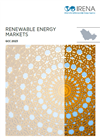

-
-
IRENA (2023), Renewable energy markets: GCC 2023, International Renewable Energy Agency, Abu Dhabi.
Copied
https://www.irena.org/-/media/Files/IRENA/Agency/Publication/2023/Dec/IRENA_Rnewable_energy_markets_GCC_2023.pdf
Copied
Renewable energy markets: GCC 2023
Newsletter
The GCC countries are some of the world’s most significant fossil fuel producers and exporters, and are among the world’s largest per capita emitters of CO2. However, this report shows that renewable energy deployment is growing in the region; albeit the share of renewables in the electricity mix of the GCC region remains negligible, accounting for only 3% of the region’s generation capacity in 2022.
Renewable energy deployment also remains highly concentrated in the region, with the UAE accounting for more than 60% of the region’s total renewables capacity and close to 70% of renewable energy investments; yet investments and deployments are expected to accelerate across all GCC states as they implement their renewable energy plans.
The energy transition, including renewable energy deployment, presents the region with opportunities for climate change mitigation and adaptation as well as economic diversification. Climate vulnerability is high in the region, reinforcing the importance of urgent climate mitigation and adaptation actions in which renewables play a critical role.
The GCC has a solid energy infrastructure that can be leveraged and built on for increased shares of renewables. Domestically, investments in renewables in the GCC are expected to reach new heights in the years to come following COP28. While the region’s past has clearly been shaped by fossil fuels, its future may well be shaped by renewables.




